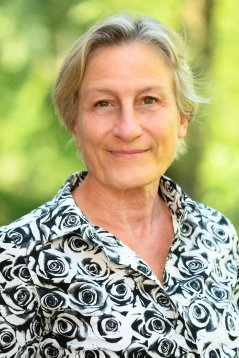
News
Dies Natalis speaker Nicole Dubilier: ‘We are only beginning to realise the importance of microbes’
It is becoming increasingly clear that communities of microorganisms are vital to life on Earth. Marine microbiologist Nicole Dubilier: ‘Bacteria communicate with their host to let them know that they are partners.’
‘If we didn’t have microorganisms on Earth, life as we know it on our planet would cease to exist within a very short time.’ Nicole Dubilier, who will give the keynote speech at the Dies Natalis at WUR on March 8th, is quite clear about the tiny little creatures that inhabit our planet, food systems and body. Most microbes – bacteria, viruses, fungi and tiny algae – are beneficial for other life forms, and we are only beginning to realise their importance in our life and environment.
How genome research unravels the microbiome
‘For a long time, we could only study and understand cultured microbes’, explains Dubilier. ‘We had to isolate them and learn how to keep them in culture. But genomics has revolutionised microbial research. We now can take a sample with thousands of microbes on your skin or in your gut and analyse their DNA. With the help of new sequencing techniques and bioinformatics, we can now reconstruct most of the genomes of microbes in our environment.’
We discovered that the human body is inhabited by millions of microorganisms that are mostly beneficial to us.
As a result, we have started to understand the microbiome in and on our bodies in the past twenty years. The human microbiome was mainly associated with pathogens and diseases, says Dubilier, but with our ability to sequence the DNA of microbes more quickly and cheaply, we discovered that the human body is inhabited by millions of microorganisms that are mostly beneficial to us. As a result, a lot of probiotics have been developed by the food and drug industry. Instead of antibiotics, capsules with ‘good’ microbes can wash out and recolonise the pathogens or ‘bad microbes’ in our body.
Ancient solution
Dubilier: ‘We can also treat people who suffer from gut diseases with fecal transplants, with amazing results. Stool transplants were first described in ancient China and were well known for treating camels and horses, but have only recently been recognised as valuable in Western healthcare.’
Nicole Dubilier heads the Symbiosis Department at the Max Planck Institute for Marine Microbiology in Bremen, Germany. Her lab studies the diversity, ecology and evolution of symbioses between microorganisms and marine animals. Dubilier and her team have revealed how beneficial interactions with microorganisms allow animals to thrive in nutrient poor environments.
Symbiotic relations between marine animals and bacteria
Her research is on marine animals like worms and mussels that live in a symbiotic relationship. ‘The worms are so well fed by the symbiotic bacteria inside their bodies that they have come to fully rely on them and no longer have a mouth or gut. The bacteria not only supply nutrition, they also recycle their waste compounds. These symbioses are highly energy efficient, and allow the worms to thrive in nutrient-poor ecosystems like coral reefs and seagrass meadows.’

Dubilier also works on symbiotic community in the deep sea, found at hydrothermal vents and cold seeps. In these environments, large communities of mussels, clams and tube worms (large arm-thick worms that can become two meters long) can thrive thanks to their symbioses with beneficial bacteria. Like the worms in shallow waters, the tube worms don’t have mouths and guts and rely fully on their bacteria for nutrition.
Microbial communication: The symbiotic sucesses in nature and food production
A common theme in these associations is the ability of the animal hosts to distinguish between their microbial partners and the multitudes of other microorganisms in their environment. ‘The bacterial symbionts are able to communicate with their hosts to let them know they are their partners. The genes and proteins the symbionts use for this communication are quite similar to those of human beneficial microbes in and on our bodies. These conversations between hosts and their microbiome allow them to only let friendly microbes in and keep out the party crashers.’ Dubilier assumes that this mechanism is highly conserved during evolution.
There is a lot more to discover, now that we can analyse entire communities of microorganisms with new techniques. These techniques may also help reveal some of the secrets of food production. Dubilier: ‘We all know that microbes are essential for getting cheese to ripen, with hundreds of cheese makers using their secret culture of microorganisms to make their special local cheese. Now people are analysing the microbial communities of cheese to find and standardise their magic formula. The same may happen with wine microbiomes. All wines have their specific ‘terroir’, as a result of the grape variety, the local climate and the microbiome of the grape vines and the soils in which they grow. Understanding more about how these microbiomes contribute to the taste of wine is a growing field.’
Researchers also need to understand more about the microbes growing in wastewater reactors or degrade plastics, to develop a new generation of carbon-neutral products. ‘Most industries in the food and environmental sector understand the importance of harnessing the power of beneficial microbes for a more sustainable future.’
CV
Nicole Dubilier is a Director at the Max Planck Institute for Marine Microbiology in Bremen. Dubilier moved from the USA to Germany as a teenager and gained her PhD in Marine Zoology at the University of Hamburg, Germany. After a two year postdoctoral fellowship at Harvard University, she joined the Max Planck Institute for Marine Microbiology in 1997. Dubilier's awards and honors include the Leibniz Prize (Germany's most prestigious research prize) and a European Research Council Advanced Grant. She serves on many national and international advisory boards, scientific councils and other commissions.